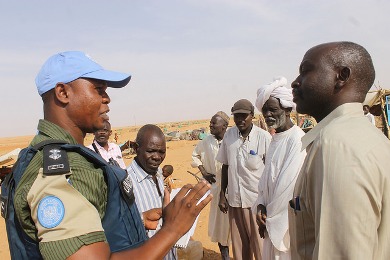UN chief says agreement on UNAMID’s withdrawal has yet to be achieved
June 9, 2015 (KHARTOUM) – The United Nations secretary-general Ban Ki-moon revealed that no agreement on the exit strategy of the hybrid peacekeeping mission in Darfur (UNAMID) has been reached yet.

A tripartite working group comprised of officials from the Sudanese government, UN and AU was formed to draft an exit strategy for the peacekeeping force.
In a report to the UN Security Council (UNSC) on 26 May, Ki-moon said that no agreement on the exit strategy of UNAMID has been reached yet by the joint working group, adding that the group’s meetings were suspended and are supposed to resume later this year.
He further said that UNAMID suggested during the negotiations to withdraw gradually from West Darfur, and leave from three bases in North and South Darfur, in areas that do not currently necessitate its presence, noting that withdrawal from other areas would only be possible if a ceasefire and protection of displaced are ensured.
The UN chief said the working group visited Darfur’s five states to assess the humanitarian and the security situation, pointing that it met two times during May to discuss the recommendations which are supposed to be submitted to the UNSC and the African Union Peace and Security Council (AUPSC) ahead of the renewal of the UNAMID’s mandate this month.
He urged the UNSC and the AUPSC to issue clear directives in order to finish the exit process quickly.
He said that the first phase of UNAMID’s downsizing included the cancellation of 790 national, international and voluntary posts, suggesting cancellation of 488 posts in the second stage.
Given the current situation in Darfur, the UN chief recommended the UNSC to extend the mandate of UNAMID, without modification, for 12 months, until 30 June next year.
UNAMID has been deployed in Darfur since 2007 with a mandate to stem violence against civilians in the restive region.
It is the world’s second largest international peacekeeping force with an annual budget of $1.35 billion and almost 20,000 troops.
ARMED CONFLICT, BANDITRY AND TRIBAL FIGHTING
Meanwhile, the report said that fighting between government forces and rebel groups have escalated during the last three months, pointing to increased tribal fighting, banditry and human rights violations.
It said the government intensified its military campaign known as “Decisive Summer” against the Sudan Liberation Movement/Minni Minnawi (SLM-MM) and Sudan Liberation Movement/Abdel-Wahid (SLM-AW) and the Justice and Equality Movement (JEM) leading to the displacement of more civilians.
The report pointed to the mutual attacks between the government troops and the rebel groups, mentioning the battle which took place at Al-Nikhara in South Darfur last April between the government militia of the Rapid Support Forces (RSF) and the JEM.
It said that 15 civilians died and 17 others injured as a result of the government aerial bombing at Al-Toumat village near Al-Nikhara, adding that 14 people including 5 children had died and 18 others injured at Rwata town in Central Darfur state due to aerial shelling.
The UN secretary-general blamed the Sudanese government for using cluster bombs during its military offensive that aimed to put an end to the armed rebellions in Darfur, South Kordofan, and the Blue Nile state.
He said the government offensive in Darfur focused on reclaiming Jebel Marra and preventing the armed movements from crossing the borders with South Sudan to regroup.
“Despite their numerical superiority, better equipment and logistics, the objective of the Sudanese Armed Forces/Rapid Support Forces joint operations, which was to dismantle the rebel stronghold of Jebel Marra, and establish a firm grip on the area, was not achieved,” Ban Ki-moon said.
The report also said that 278 people died in 11 tribal clashes during the last three month compared to the death of 40 people in 8 clashes in the previous period, pointing to clashes which took place between Falata and Salamat tribes in South Darfur besides clashes between Ma’alia and Rezeigat in East Darfur.
It mentioned that 316 crimes have taken place during the past three months including robberies, armed attacks, deadly shooting, rape, carjacking and kidnapping, saying that 60 hostile acts have been carried out against UNAMID.
(ST)
